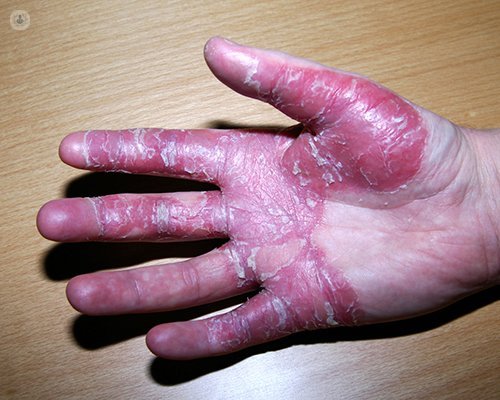Psoriasis: everything you need to know about this condition
Escrito por:
Psoriasis is an inflammatory skin disease which in its classical appearance consists of very pink, scaly, sometimes itchy skin.
The condition is not contagious, and usually appears on the elbows and knees. The condition does not cause most people any problems, as it often only appears in small patches, but occasionally the patches can be larger, and can cause soreness.

How common is psoriasis?
Psoriasis affects 1.3 - 2.2% of the UK adult population, can start during childhood or in adulthood, and affects men and women equally.
What does psoriasis look like?
Psoriasis can affect different areas of the body. Some people may only be affected on the nails, palms and soles while others may have their entire body affected. Often Psoriasis affects only the elbows and knees.
The condition can also change with time, initially starting off in one area and then clearing from that area to affect other areas.
What causes psoriasis?
There is no clear answer as to its cause: it is a complicated picture with genetic, environmental and immunological elements all coming together.
By genetic elements we mean that although there is no single gene that makes a person more susceptible there is approximately 40% risk of developing psoriasis if both parents are affected.
However, you do not need a family history to have some altered genes making you susceptible to having the disease. There is no gene test to determine whether you are likely to get the disease.
By environmental elements we mean levels of high stress (times of bereavement, losing or starting a new job, relationship problems etc.) can cause the condition to develop. Medications such as lithium or beta blockers, excess alcohol, smoking, illicit drugs (cannabis, cocaine etc.), increasing weight can all cause the condition to develop.
The immunological elements include sore throats (mainly bacterial but can also be viral), infections, anything that sets in motion the natural immune system.
Psoriasis can be triggered when some or all of these elements come together.
Is there anything else that is affected by having psoriasis?
- About 30% of all patients with psoriasis can also suffer from psoriatic arthritis.
- Anywhere between 30-60% of those with psoriasis can have mental health problems such as depression and anxiety. In some, these symptoms can be because of the disease, and in others the mental health issues can be an underlying factor in exacerbating the disease.
- There is an association between having psoriasis and increase in weight.
- Inflammatory bowel disease (Crohns’ disease) is associated with psoriasis
Are there any treatments?
There is no known cure for psoriasis. All treatments are aimed at relieving the symptoms and allowing people to continue with their lives, putting psoriasis in the background.
- The first step is to get the correct diagnosis (see your GP in first instance, then see a dermatologist if the GP is not certain).
- In most cases, mild psoriasis should respond well to emollient creams, topical steroids and/or vitamin D analogues.
- If these are not effective then your GP should refer you to a dermatology department for consideration of phototherapy or oral medications.
- Ultraviolet light (phototherapy) can also be included in topical treatments. Phototherapy treatment is where the correct dose of light according to your skin type is calculated and given in small doses to prevent burning (tanning salons are not safe places to get therapeutic doses of light and can put you at risk of skin cancer).
- If topical treatment with phototherapy is not effective then the Consultant dermatologists will discuss either tablet medication or injections (biologics).
If you think you may have psoriasis, book an appointment with a consultant dermatologist.


